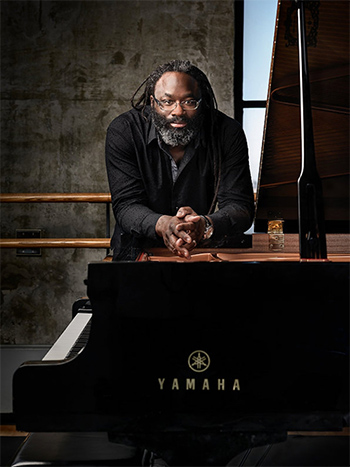by Daniel Hathaway

We last caught up with the pianist two years ago this month, before his performance on the Tri-C Classical Piano Series. In an interview with Jarrett Hoffman, Pratt talked about his training at the Peabody Conservatory (where he was the first to graduate with three diplomas — in piano, violin, and conducting), his prizes (he won the 1992 Naumburg Piano Competition and an Avery Fisher Career Grant two years later), his three visits to the White House (under presidents Clinton and Obama), and his appearance on Sesame Street (when he shared a piano with Big Bird).
I spoke with Awadagin Pratt by telephone at the Cincinnati College-Conservatory, where he teaches, and began by asking what’s been happening in his life during the last two years. “Everything and nothing!” he said, laughing. “Things are busy and that’s good. This will be my second recital of the season. So far, I’ve played the Grieg Concerto, and had some chamber music, master classes, and judgings, so the fall has been eventful, with variety for sure.”
The variety will continue next month. Pratt said he’s looking forward to a trip to Abu Dhabi in the United Arab Emirates in early December. “I’ll be playing this same program and giving a lecture — there’s an outpost of NYU in the city. It’ll be nice to get to see that part of the world.”
A thread runs through the program he’s curated for Elyria and the Emirates. “It features fugues rather prominently in all the pieces, and more to the point, with the Beethoven as inspiration, the works all deal with thematic transformation and the unifying of ideas,” he said.
“The germ in the first measures of Op. 110 provides material for a lot of the rest of the piece, including the subject of the fugue. In the Franck, you have the Prelude and Chorale, then at the end of the Fugue, he brings the chorale theme in on top of it with the rhythmic figuration of the Prelude, so everything comes together wonderfully. And with the Liszt Sonata, you have one main idea of sixteen measures or so at the beginning that permeates the entire work in every possible way.”
I mentioned that it was interesting that Liszt wrote only one work he called Sonata. “Although there’s the piece we refer to as the ‘Dante Sonata,’” Pratt said. “Liszt was obviously attracted to extramusical sources of inspiration, but with this work, he also wanted to prove that he could be completely inventive within a strict form.”
Pratt went on to talk about the use of fugue. “Beethoven’s third movement, which unconventionally introduces a recitative, goes on to a lament, then into a fugue which collapses back into the lament. Then there’s a rebirth where Beethoven gives the fugue full Bachian treatment, using everything in the way of virtuoso fugue technique. Although it would fit, I’m not playing Lera Auerbach’s Chorale, Fugue, and Postlude on this program, but it’s nice to know that even living composers are still fascinated by the technique and want to deliver fugues for us.”
Pratt said that he put the Liszt Sonata away for seven or eight years and has only recently decided to bring it back. What has the piece gained from spending time on the shelf? “I’m not sure yet,” he said. “I may have forgotten what I used to do, so everything seems fresh again. I’m playing it on Thursday, so we’ll see. There are probably some issues in pacing the 30-minute work so it hangs together structurally. I might be a little bit freer with it now — but time will tell.”
One thing missing that usually figures on Signature Series programs is a work by the Series’ artistic director, Jeffrey Mumford. “He’s a wonderful composer, but I really didn’t have the bandwidth to get my hands around some new music this time,” Pratt said.
Past the end of the calendar year, Awadagin Pratt is looking forward to exercising his other musical skills. He’s playing Beethoven’s First Concerto with the Chamber Orchestra of Pittsburgh in May, conducting from the keyboard, in a concert that may be presented in Tbilisi, Georgia beforehand. And he’s been invited to conduct Porgy and Bess with Greensville Opera next November, which he thinks is a “very cool” assignment.
And does he get to play violin now and then? “I have this festival called Art of the Piano,” he said. “Last year we held a Schubertiad after a performance of Winterreise for which I played first violin in the slow movement of the cello quintet with students from the Cincinnati Conservatory. But anytime I pick up the violin these days it’s usually one little movement for some kind of benefit — and I spend about three or four months practicing before trotting it out!”
Published on ClevelandClassical.com November 12, 2019.
Click here for a printable copy of this article



